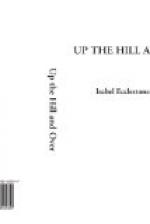“You see, dear Miss Milligan, how much I need it.”
“Indeed a blind bat could see that!” said the dressmaker pityingly. “Shall I call the nurse?”
But Mrs. Coombe would not hear of Miss Milligan calling the nurse!
CHAPTER XXXIII
It is the onlooker who sees most of the game and Aunt Amy was an ideal onlooker. Always self-effacing and silent, she was now more silent and self-effacing still. Consequently the principal actors tended to forget their parts when in her presence. No one explained anything to Aunt Amy but no one concealed anything from her. She simply “didn’t matter.” So far as the playing out of the little drama was concerned, Aunt Amy was supposed to be safely off the stage. She looked and listened, had her strange flashes of psychic insight and came to her own conclusions about it all, quite undisturbed by facts as they appeared to others. Her conclusions were very simple. Esther loved the doctor. The doctor loved Esther. That, in spite of this, Callandar was deliberately planning to marry Mary she considered a purely arbitrary matter arranged by those mysteriously malignant powers known as “They.” Callandar, himself, had clearly no choice, Esther was helpless, and Mary triumphed easily and inevitably because Mary was one of “Them” herself. Aunt Amy had become firmly convinced of this latter fact. Everything went to prove it—the theft of the ring, the threat to shut her (Amy) up, the easy triumph over Esther, and a thousand and one trifles all “confirmation strong as proofs of holy writ.” Of course it would be impossible to make this clear to Esther or the doctor. Amy realised that and did not try. But in her own mind she thought of it continually. And her little pile of proof mounted higher day by day.
Esther, absorbed in the care of her step-mother, was not even aware that Aunt Amy noticed her growing listlessness, her heavy eyes, her fits of brooding. She did not know that a silent foot paused before her closed door, listening. All she knew was that it was relief unspeakable to be with Aunt Amy, to let drop the mask of cheerful energy without fear of questioning or of wonder. Aunt Amy didn’t matter.
Mary, too, felt that it was needless to hoodwink Amy. No need to pretend with her. She might show herself as irritable, as conscienceless, as nerve-racked and disagreeable as she chose without fear of displaying “symptoms.” Aunt Amy was not looking for symptoms, indeed Mary thought she grew more stupid daily. After her marriage something would really have to be done about Amy. She hoped the doctor wouldn’t be silly about it.
Even Dr. Callandar was not careful to hide his burden from those faded eyes. He was more self-conscious even with Ann or Bubble than he was with her. What matter if she did see his mouth harden or his eyes burn?—Poor Aunt Amy, such things could have no meaning for her. She was a soul apart.




